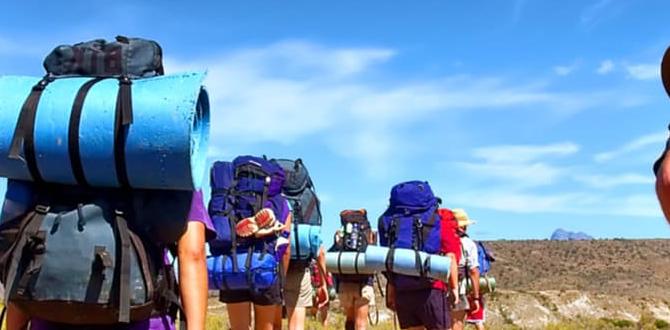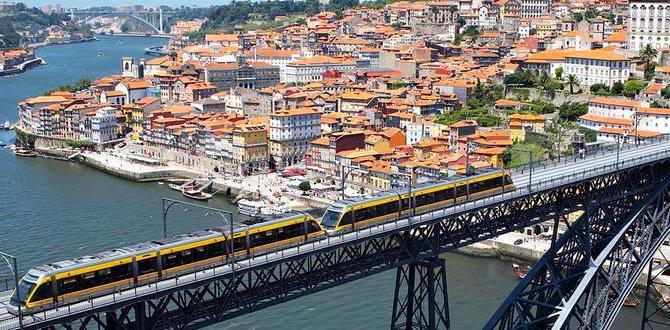Planning a Beirut summer trip guide involves exploring vibrant culture, delicious food, and historical sites while staying comfortable. This guide offers essential tips for a memorable and stress-free vacation in Lebanon’s capital, ensuring you pack smart and enjoy every moment.
Beirut in the summer is a city that hums with energy. The Mediterranean sun warms its ancient streets, and a vibrant nightlife awakens after dusk. But planning a trip to a city with such a rich, layered history can sometimes feel a bit overwhelming, especially during the peak warm season.
You might wonder what to pack, how to navigate, or simply how to make the most of your visit without feeling rushed or unprepared. Don’t worry! This guide is here to help you every step of the way. We’ll break down everything you need for an amazing Beirut adventure, from essential travel items to uncovering the most stunning spots this incredible city has to offer. Get ready to explore!
Why Beirut in the Summer?
Summertime in Beirut offers a unique blend of experiences. The weather is typically warm and sunny, perfect for exploring historical landmarks, relaxing by the sea, or enjoying the city’s famous outdoor cafes and restaurants. The long daylight hours mean more time for sightseeing, and the city comes alive with festivals and cultural events. While it can be hot, strategic planning can ensure your comfort and allow you to fully immerse yourself in Beirut’s captivating atmosphere.
Essential Packing List for Your Beirut Summer Trip
Packing light yet smart is key for a comfortable summer in Beirut. Think breathable fabrics, sun protection, and versatile items you can mix and match. Remember, Beirut can be a fashion-conscious city, so packing a few stylish pieces will help you feel right at home whether you’re dining at a chic restaurant or wandering through picturesque neighborhoods.
Clothing
- Lightweight, breathable tops (cotton, linen)
- Comfortable shorts and skirts
- A few pairs of lightweight trousers or capris
- A light jacket or cardigan for cooler evenings or air-conditioned interiors
- Modest clothing options (e.g., longer skirts, tops that cover shoulders) for visits to religious sites. It’s respectful to have these on hand.
- Swimwear if you plan to visit beaches or hotel pools
- One or two dressier outfits for evenings out
Footwear
- Comfortable walking shoes or sandals are a must! You’ll be doing a lot of exploring.
- Flip-flops for the beach or pool
- Dressier sandals or flats for evenings
Accessories
- Sunscreen (high SPF)
- A wide-brimmed hat or cap
- Sunglasses
- A reusable water bottle to stay hydrated
- A small backpack or crossbody bag for daily essentials
- Any necessary personal comfort items. For instance, if you require extra comfort or security during long travel days or extended exploring, consider packing personal care items like adult diapers or discreet, absorbent liners. These can make a significant difference in maintaining confidence and comfort, much like having a reliable travel pillow for a long flight. Brands offering options for various absorbency levels can be a lifesaver, ensuring you can focus on enjoying your trip rather than worrying about personal needs. You can find helpful information on choosing the right products from resources like the NHS website on sunburn prevention, which emphasizes the importance of protection.
- A portable power bank for your phone
- Basic first-aid kit (band-aids, pain relievers, antiseptic wipes)
- Insect repellent, especially for evenings outdoors
Documents & Money
- Passport and visa (if required)
- Copies of important documents (stored separately)
- Credit/debit cards
- Some cash (USD is widely accepted, but Lebanese Lira is the local currency)
- Travel insurance details
Navigating Beirut: Getting Around
Getting around Beirut is part of the adventure! The city offers various transportation options, each with its own advantages. Understanding these can help you plan your days efficiently and affordably.
Taxis and Ride-Sharing Apps
Taxis are plentiful and a convenient way to travel. Always agree on a fare before starting your journey, or ensure the meter is used. Ride-sharing apps like Uber and Bolt are also very popular and offer transparent pricing. They are often a preferred method for many visitors due to their reliability and ease of use.
Public Transport
Beirut has a public bus system, but routes can be complex for visitors. For shorter distances or a more local experience, “service taxis” (shared taxis that follow fixed routes) are an option. These are very affordable but require a bit of local knowledge to navigate.
Walking
Many central areas of Beirut, like Downtown, Gemmayzeh, and Mar Mikhael, are best explored on foot. This allows you to soak in the atmosphere, discover hidden cafes, and appreciate the architecture at your own pace. Comfortable shoes are your best friend here!
Must-See Attractions & Stunning Sights
Beirut is a city brimming with history, culture, and natural beauty. From ancient ruins to vibrant modern districts, there’s something to captivate every traveler.
Downtown Beirut (Beirut Central District)
This area has been beautifully rebuilt and showcases a mix of historical architecture and modern development. You can explore the Roman Baths, visit the Sursock Museum (though check its current exhibition status), and wander through Martyrs’ Square. The contrast between old and new is fascinating.
Corniche Beirut
This iconic seaside promenade is perfect for a leisurely stroll, especially in the early morning or late afternoon. Enjoy views of the Mediterranean Sea, watch locals exercise, and maybe even grab a fresh juice from a street vendor. The Pigeon Rocks (Raouché Rocks) are a spectacular natural landmark visible from the Corniche.
Gemmayzeh and Mar Mikhael
These adjacent neighborhoods are the heart of Beirut’s vibrant nightlife and culinary scene. They are filled with charming streets, trendy cafes, traditional pubs, and excellent restaurants. Even during the day, they offer a fantastic glimpse into the city’s artistic and bohemian side.
National Museum of Beirut
A visit here is essential for understanding Lebanon’s rich history. The museum houses an impressive collection of archaeological artifacts spanning millennia, from prehistoric times to the Ottoman era. It provides crucial context for the country’s heritage.
Sursock Museum
Dedicated to modern and contemporary Lebanese art, the museum is housed in a stunning Italian Renaissance-style villa. It’s a beautiful building and a great place to appreciate the local art scene.
Hamra Street
Once the intellectual and cultural hub of Beirut, Hamra Street is still a bustling commercial avenue with shops, cafes, and theaters. It retains a lively atmosphere and offers a taste of traditional Beirut life.
Jeita Grotto
A short trip outside Beirut, this natural wonder features stunning limestone caves with remarkable formations. You can explore the upper and lower grottoes via foot and boat, respectively. It’s an easy and rewarding day trip.
Culinary Delights: What and Where to Eat
Lebanese cuisine is world-renowned for its fresh ingredients, vibrant flavors, and diverse meze (small plates). Beirut is the perfect place to indulge your taste buds.
Must-Try Dishes
- Mezze: Hummus, baba ghanoush, tabbouleh, fattoush, falafel, kibbeh are just a start!
- Shawarma: Thinly sliced meat (lamb, chicken, or beef) rolled in bread with sauces and vegetables.
- Manakish: A flatbread topped with za’atar, cheese, or meat, often eaten for breakfast.
- Kafta: Spiced minced meat, often grilled or baked.
- Fresh Seafood: Available along the coast.
- Desserts: Baklava, knafeh, and various regional sweets.
Dining Experiences
Beirut offers everything from casual street food stalls to high-end dining. Don’t be afraid to try local bakeries for breakfast manakish or small eateries for authentic shawarma. For a more refined experience, explore the restaurants in Gemmayzeh or Mar Mikhael. Many rooftop restaurants offer stunning city views, especially at sunset.
Staying Comfortable and Prepared for the Heat
Summer in Beirut can be quite warm, with temperatures often reaching the high 30s Celsius (around 90-100°F). Staying cool and comfortable is crucial for enjoying your trip.
Hydration is Key
Always carry a water bottle and refill it frequently. Avoid sugary drinks, which can dehydrate you faster. Freshly squeezed fruit juices are a refreshing and healthy option.
Dress for the Weather
As mentioned in the packing list, opt for loose-fitting, light-colored clothing made from natural fabrics like cotton and linen. This allows your skin to breathe and helps regulate body temperature. Hats and sunglasses are non-negotiable for sun protection.
Plan Your Activities Wisely
Schedule strenuous outdoor activities for the cooler parts of the day – early morning or late evening. Use the midday heat for indoor activities like visiting museums, enjoying long lunches in air-conditioned restaurants, or relaxing at your hotel.
Seek Shade
Take advantage of Beirut’s many cafes with outdoor seating under awnings or in shaded courtyards. When walking, stick to the shady side of the street whenever possible.
Personal Comfort Solutions
For some travelers, managing personal comfort in hot weather can be an added consideration. If you require discreet and reliable solutions, especially for extended outings or travel, having access to products like adult diapers or highly absorbent pads can greatly enhance your peace of mind. These items are designed for maximum comfort and discretion, allowing you to remain focused on your travel experiences.
Many brands offer specialized products that are breathable and secure, ensuring you can explore confidently. It’s about ensuring every traveler can enjoy their journey without added worry. For general health and preparedness, the CDC’s advice on traveler’s diarrhea prevention also highlights how being prepared can lead to a healthier trip.
Cultural Etiquette and Safety Tips
Beirut is a welcoming city, but understanding some local customs and safety tips will enhance your experience.
Respectful Dress
While Beirut is relatively liberal, it’s advisable to dress modestly when visiting religious sites (mosques, churches). Covering your shoulders and knees is generally a good practice.
Greetings
A handshake is common. When greeting someone for the first time, a polite “As-salamu alaykum” (Peace be upon you) is appreciated, though not strictly necessary with tourists.
Tipping
Tipping is customary in Beirut. A 10-15% service charge might already be included in restaurant bills, but tipping further for good service is appreciated. For taxi drivers, rounding up the fare is common.
Safety
Beirut is generally safe for tourists, but as with any major city, be aware of your surroundings. Keep valuables secure, avoid displaying large amounts of cash, and be cautious of common tourist scams. Stick to well-lit streets at night and use reputable transportation.
Photography
Always ask permission before taking photos of people, especially women and children. Be mindful of photography restrictions around government buildings or military installations.
Sample Itinerary: A Taste of Beirut Summer
Here’s a possible 4-day itinerary to give you a feel for Beirut’s summer charm:
Day 1: Arrival and Coastal Charm
- Arrive at Beirut Rafic Hariri International Airport (BEY).
- Check into your accommodation.
- Afternoon: Stroll along the Corniche, visit the Raouché Rocks.
- Evening: Dinner in the lively Hamra district.
Day 2: History and Art
- Morning: Explore the National Museum of Beirut.
- Afternoon: Wander through Downtown Beirut, see the Roman Baths.
- Late Afternoon: Visit the Sursock Museum.
- Evening: Experience the buzzing nightlife and dining scene in Gemmayzeh.
Day 3: Day Trip and Local Flavors
- Morning: Take a trip to the stunning Jeita Grotto.
- Afternoon: Visit the ancient city of Byblos (Jbeil) (optional, or relax by the hotel pool/beach).
- Evening: Enjoy meze and traditional dishes in Mar Mikhael.
Day 4: Markets and Departure
- Morning: Explore a local souk or market for souvenirs (e.g., Souk al-Ata’a if open or specialized shops).
- Late Morning: Enjoy a final Lebanese breakfast (manakish!).
- Afternoon: Depart from Beirut.
Budgeting for Your Beirut Summer Trip
Beirut can cater to various budgets. Here’s a general idea of costs to help you plan:
Accommodation
Luxury hotels can range from $150-$300+ per night. Mid-range hotels are typically $70-$150. Budget-friendly guesthouses or Airbnb options can be found for $40-$70.
Food
Street food and casual meals: $5-$15 per person. Mid-range restaurants: $20-$40 per person. Fine dining: $50+ per person.
Transportation
Taxis and ride-sharing: Expect $5-$15 for most intra-city trips. Public transport is very cheap, often less than $1 per ride.
Activities
Museum entry fees are usually modest ($5-$10). Day trips to attractions like Jeita Grotto will involve transportation and entrance fees (around $20-$50 depending on how you get there and if you join a tour).
It’s wise to have a mix of cash and cards. While card acceptance is growing, many smaller establishments and taxis still prefer cash.
Summer Festivals and Events in Beirut
Beirut traditionally hosts a variety of cultural events and festivals during the summer months. These can include music concerts, art exhibitions, and religious celebrations. Checking local event listings closer to your travel dates is recommended. The Baalbek International Festival, though held in Baalbek, often has associated events or draws attendees from Beirut. Keep an eye on official tourism websites or cultural organizations for the most up-to-date schedules.
Conclusion
Beirut in the summer is an unforgettable experience, a city where ancient history meets modern vibrancy under the Mediterranean sun. From its stunning coastal views and bustling souks to its world-class cuisine and resilient spirit, there’s so much to discover. By packing smart, understanding how to navigate the city, respecting local customs, and planning your days to account for the warm weather, you’re setting yourself up for a truly rewarding journey.
Whether you’re exploring historical ruins, getting lost in charming neighborhoods, or savoring delicious Lebanese food, this Beirut summer trip guide aims to equip you with the essentials for a comfortable, safe, and utterly stunning vacation. Embrace the energy, soak in the culture, and create memories.
Frequently Asked Questions
What is the best way to pack for Beirut in the summer?
Pack light, breathable clothing like cotton and linen. Include comfortable walking shoes, sun protection (hat, sunscreen, sunglasses), and a light layer for evenings. Also, pack modest clothing options for religious sites.
Is Beirut safe for tourists in the summer?
Beirut is generally safe for tourists, but like any large city, it’s important to be aware of your surroundings, keep valuables secure, and be cautious. Stay informed about current local conditions through official travel advisories.
What currency is used in Beirut?
The local currency is the Lebanese Lira (LBP). However, the US Dollar (USD) is widely accepted in many places, especially for larger purchases and in tourist areas. It’s smart to carry both.
Is it very hot in Beirut during the summer?
Yes, summers in Beirut are typically hot and humid, with temperatures often reaching the high 30s Celsius (90-100°F). Staying hydrated, seeking shade, and planning outdoor activities for cooler parts of the day is essential.
What should I wear to visit religious sites in Beirut?
For respectful visits to mosques and churches, it’s recommended to cover your shoulders and knees. For women, a headscarf may also be required for entry into some mosques.
Are ride-sharing apps reliable in Beirut?
Yes, ride-sharing apps like Uber and Bolt are widely used and reliable in Beirut, offering a convenient and transparent way to get around the city. They often provide a good alternative to traditional taxis.
Do I need a visa to visit Lebanon?
Visa requirements depend on your nationality. Many nationalities can obtain a tourist visa upon arrival at the airport. However, always check the latest visa regulations for your specific country of origin from the Lebanese embassy or consulate in your home country before traveling.






